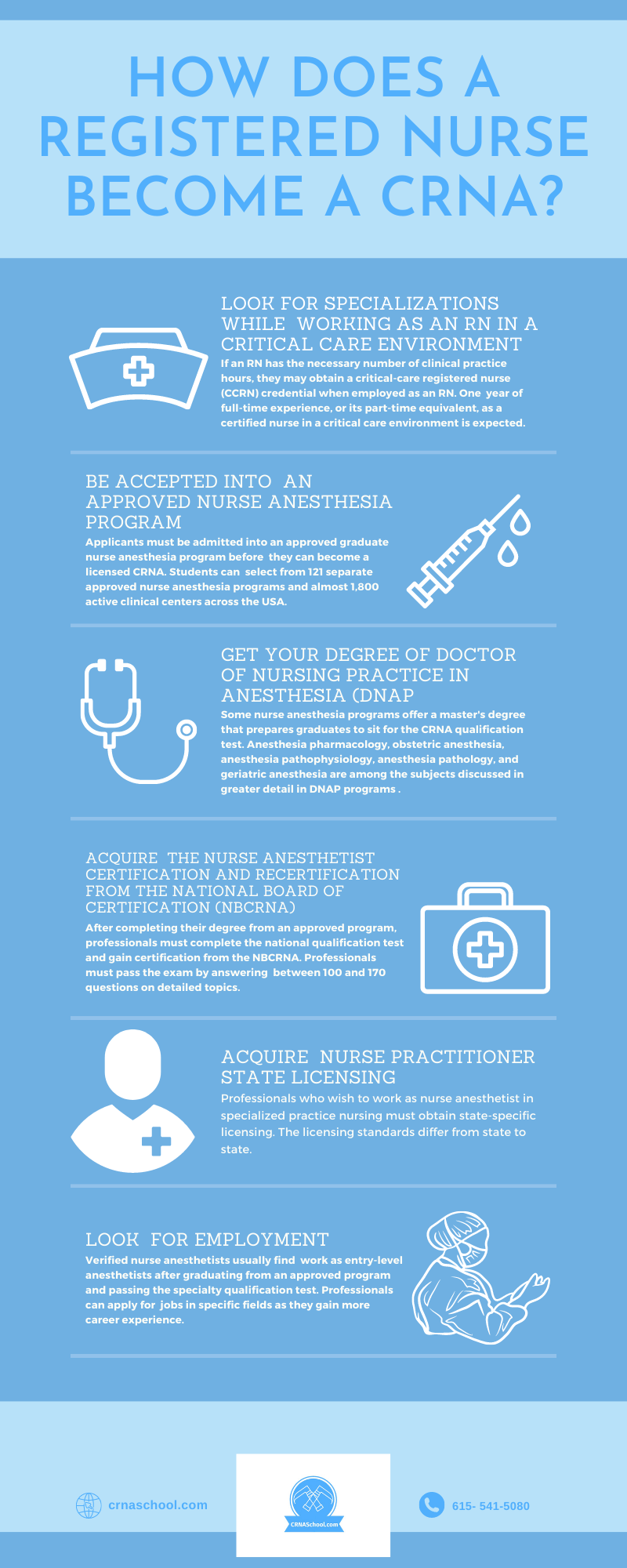Licensed Nurses with a CRNA degree provide anesthesia in conjunction with physicians, dentists, podiatrists, physician anesthesiologists, and additional healthcare experts, according to the American Association of Nurse Anesthetists, and provide the bulk of anesthesia services in rural America.
A registered nurse must meet important criteria in order to become a CRNA, pursuing specializations, enrolling in an approved nurse anesthesia program, achieving qualifications, and obtaining licenses.
Consider becoming a Certified Registered Nurse Anesthetist (CRNA) if you are a registered nurse who is self-sufficient, devoted to delivering high-quality patient care, and active in progressing in your profession. You’ll also be making substantially more money. Plus, you’ll have plenty of job opportunities in a burgeoning profession. From 2018 to 2028, the Bureau of Labor Statistics expects a 17 percent rise in work openings and demand for CRNAs.
Below, we’ll look at the steps a registered nurse must take to become a CRNA.
Is a CRNA a nurse?
An advanced practicing registered nurse (APRN) who is licensed and qualified to provide anesthesia for surgery, labor, and childbirth, emergency treatment, or pain relief is classified as a nurse anesthetist.
The CRNA degree offers the expertise and training required to prescribe anesthesia to patients, as well as observe and advise physicians of their patients’ conditions when they are under anesthesia. Pre- and post-anesthesia treatment and reports are given by degrees.
Some people are surprised to hear that nurses and anesthesiologists deliver anesthesia care in the same way: they provide the same treatment with the same operations in the same styles of hospitals. The anesthesiologists work with the CRNAs to provide the best quality treatment for the patients.
According to the American Association of Nurse Anesthetists (AANA), nurse anesthetists have the bulk of hands-on anesthesia emergency treatment in the United States.
Certified Registered Nurse Anesthetists (CRNAs) originated during the Civil War, when nurses on the front lines began prescribing chloroform to injured soldiers. Today, CRNAS deliver anesthesia in almost all rural American hospitals, and are the exclusive anesthesia services for men and women working in the United States Armed Forces (USAF) .
You’ll find a lively, in-demand job as a CRNA, but you’ll require advanced preparation and outstanding education to smooth the path to the top of the nursing profession.

What Are the Requirements for a CRNA Degree?
Though each CRNA curriculum has its own set of standards, the chief requirements are usually the same for all schools.
- A bachelor’s or master’s degree in nursing or a related field is needed.
- A valid certificate as a Registered Nurse or Advanced Practice Nurse with no restrictions.
- One year of full-time service as an RN in a critical care environment is expected.
- A master’s degree in nurse anesthesia from an approved program is needed.
Most CRNA programs last two to four years. The curriculum typically provides both theoretical classroom instruction and practical clinical hours, where students learn to anesthesia care to patients in a variety of settings.

How can I become a CRNA fast?
1. Look for specializations while working as an RN in a critical care environment
If an RN has the necessary number of clinical practice hours, they may obtain a critical-care registered nurse (CCRN) credential when employed as an RN. A CCRN is a specialist credential for nurses who give primary treatment to extremely sick adult patients in every environment.
One year of full-time experience, or its part-time equivalent, as a certified nurse in a critical care environment is expected, according to the American Association of Nurse Anesthetists.

2. Be accepted into an approved nurse anesthesia program
Applicants must be admitted into an approved graduate nurse anesthesia program before they can become a licensed CRNA. Students can select from 121 separate approved nurse anesthesia programs and almost 1,800 active clinical centers across the USA.
Course standards differ by college or institution, although most require a candidate to have a current RN license, a bachelor’s degree in nursing, and a minimum GPA. A master’s degree in nursing may be needed for certain programs.
RNs joining nurse anesthesia programs usually have, on average, a total of 2.9 years of training (AANA, 2019).
3. Get your degree of doctor of nursing practice in anesthesia(DNAP)
Some nurse anesthesia programs offer a master’s degree that prepares graduates to sit for the CRNA qualification test. This is a crucial step, since by 2025, you’ll need a doctorate in nurse anesthesia to work as a CRNA. Until 2022, a few programs will already deliver a master’s degree that fits the qualification requirements.
Although CRNAs with a master’s degree will be grandfathered in, many degree-seekers are already opting for doctoral programs, which will provide them with the most specialized skills and experience in the profession and enable them to explore further job choices with higher pay.
Anesthesia pharmacology, obstetric anesthesia, anesthesia pathophysiology, anesthesia pathology, and geriatric anesthesia are among the subjects discussed in greater detail in DNAP programs

4. Acquire the Nurse Anesthetist Certification and Recertification from the national board of certification (NBCRNA)
After completing their degree from an approved program, professionals must complete the national qualification test and gain certification from the National Board of Certification and Recertification for Nurse Anesthetists. Professionals must pass the exam by answering between 100 and 170 questions on detailed topics.

5. Acquire nurse practitioner state licensing
Professionals who wish to work as nurse anesthetist in specialized practice nursing must obtain state-specific licensing. The licensing standards differ from state to state.
6. Look for employment
Verified nurse anesthetists usually find work as entry-level anesthetists after graduating from an approved program and passing the specialty qualification test. Professionals can apply for jobs in specific fields as they gain more career experience.
The Bottom Line
A licensed registered nurse anesthetist (CRNA) is responsible for efficiently prescribing anesthesia before emergency operations, then delivering vital treatment at some of the most crucial moments of their patients’ lives.
Whatever stage of your undergraduate or professional life you are in, there is a clear direction to pursue that will lead to a fulfilling future as a nurse anesthetist. If you haven’t already done so, get a CCNE-accredited bachelor’s degree in nursing from a respectable nursing school.
If you’re interested in studying more, make sure your next move is a smart investment in your nursing career.
References
- Military Medicine, Volume 171, Issue 8, August 2006, Pages 762–769, Constance L. Jenkins, NC USA, Aaron R. Elliott, NC USA, Janet R. Harris, NC USA
https://doi.org/10.7205/MILMED.171.8.762
- AANA Journal. Aug2017, Vol. 85 Issue 4, p261-269. 9p. Boyd, Donald
- The Certified Registered Nurse Anesthetist: Occupational Responsibilities, Perceived Stressors, Coping Strategies, and Work Relationships. Perry, Tristan Roberts
http://hdl.handle.net/10919/29740
- Nurse Anesthesia, A Past, Present, and Future Perspective. VOLUME 47, ISSUE 2, P215-223, JUNE 01, 2012, Wanda O. Wilson, CRNA, Ph.D., MSN

